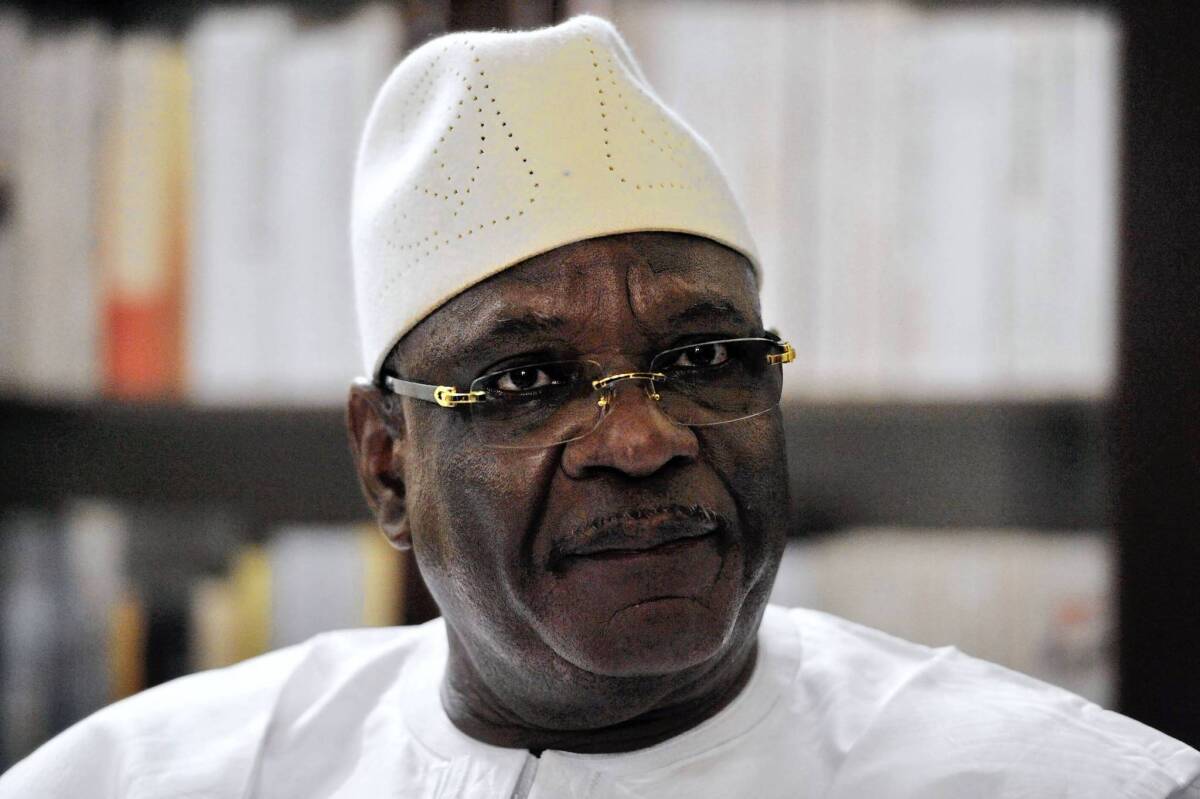Former Prime Minister Keita wins presidential election in Mali

- Share via
JOHANNESBURG, South Africa — Ibrahim Boubacar Keita won Mali’s presidential election after his rival conceded defeat late Monday in a rare gesture that won praise around the continent.
Soumaila Cisse, the opposition candidate, urged Malians to accept the result even as he told reporters at a news conference in Bamako, the capital, he believed there were serious irregularities and incidents of ballot-box stuffing. Cisse said he had not made plans to challenge the result.
In Africa’s emerging democracies, elections are often flawed and results disputed.
Cisse visited Keita late Monday to congratulate him, later announcing on Twitter that he had done so.
“My family and I went and congratulated Mr. Keita, the future president of Mali, on his victory. May God bless Mali,” the former finance minister wrote on Twitter.
Cisse’s concession opens the way for donors to pour in $4 billion of promised aid to rebuild the country. It’s hoped the massive aid injection, along with a 12,600-strong United Nations peacekeeping force, will enable the country to rebuild and will prevent the resurgence of Al Qaeda-linked militias who last year took over half the country.
Deputy State Department spokeswoman Marie Harf indicated that U.S. aid would probably resume. “We’ve made clear that following the return of a democratically elected government, we will seek to normalize our foreign assistance to Mali,” Harf told reporters in Washington.
Keita, 68, a former prime minister known as IBK, won 40% of the ballots in the first round to Cisse’s 19% and built a strong alliance going into Sunday’s runoff, attracting the other major losing candidates into his camp.
Keita has a reputation for being tough on security issues, which turned out to be a plus after Mali’s nightmarish year. Tuareg rebels in the north launched a rebellion in early 2012, when they flooded back into the country from Libya after the fall of Moammar Kadafi, bringing an arsenal of sophisticated arms.
The rebels outgunned Mali’s military, triggering a coup that in turn allowed the rebels to take advantage of the power vacuum to seize the northern half of the country. But violent Al Qaeda-linked militias swiftly outflanked the Tuareg rebels and took control in the major northern towns, imposing a severe form of Islamic law, lashing women in public, destroying ancient tombs, burning important manuscripts and punishing alleged thieves by amputating limbs.
France intervened in January, driving the militias out of the major towns and killing several top regional Al Qaeda figures. The French are withdrawing their forces as the U.N. force of 12,600 troops takes over security.
The Tuaregs, widely blamed in Bamako for the loss of the north, remain in control of the northern town of Kidal. Under the terms of a peace deal, Mali’s military occupies the town in an uneasy power-sharing arrangement with Tuareg leaders.
One of Keita’s difficult tasks will be to resolve the standoff and smooth over the long-standing resentment among Tuaregs that has led to repeated rebellions over many decades.
Cisse alleged widespread fraud in the first-round vote late last month, but African Union and European Union observers praised the election as free, peaceful and transparent.
More to Read
Sign up for Essential California
The most important California stories and recommendations in your inbox every morning.
You may occasionally receive promotional content from the Los Angeles Times.













